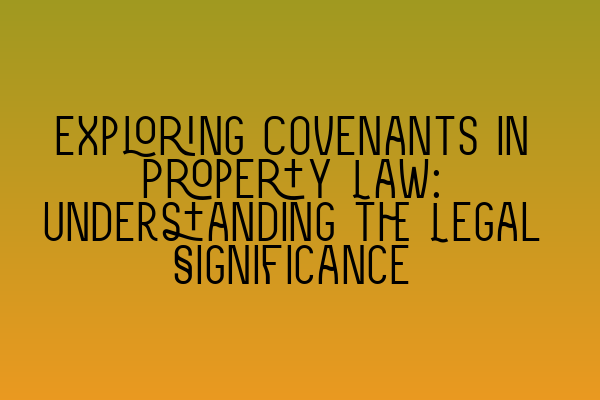Exploring Covenants in Property Law: Understanding the Legal Significance
Welcome to SQE Property Law & Land Law, where we provide expert legal advice and insights on various aspects of property law. In this blog post, we will delve into the world of covenants in property law and help you understand their legal significance. Whether you are a homeowner, tenant, or landlord, this knowledge will empower you to navigate property transactions and disputes with confidence.
What are Covenants?
Before we dive into the legal significance of covenants, let’s establish what they are. In property law, a covenant is a legally binding agreement or promise between two or more parties regarding the use, maintenance, or restrictions on a property. Covenants can be created through various means, such as in deeds, contracts, or agreements.
Now that we have a basic understanding of covenants, let’s explore their legal significance.
Enforceability
One of the key aspects of covenants is their enforceability. Once a covenant is created, it is legally binding and can be enforced by the parties involved. This means that if one party breaches a covenant, the other party can take legal action to seek remedies or damages.
Enforceability of covenants is crucial in ensuring that the terms of agreements are upheld and that the rights and obligations of the parties are protected. It provides a legal framework for property owners and tenants to maintain their rights and responsibilities.
Restrictive Covenants
A common type of covenant in property law is the restrictive covenant. These covenants impose limitations or restrictions on the use of a property. For example, a restrictive covenant may prohibit certain activities or developments on a property, such as building additional structures or using the property for commercial purposes.
Restrictive covenants serve to maintain the character and value of a property or neighborhood. They are often found in housing developments, where homeowners collectively agree to abide by certain restrictions to preserve the overall aesthetic appeal and quality of the area.
Understanding restrictive covenants is essential for property owners or potential buyers as it can impact their ability to modify or use their property as they wish. Seeking legal advice or conducting thorough due diligence when dealing with properties subject to restrictive covenants is highly recommended.
Positive Covenants
On the other hand, positive covenants require the performance of certain actions or obligations. These covenants may include responsibilities such as maintaining the property, contributing to communal expenses, or adhering to specific regulations.
In some cases, positive covenants may run with the land, meaning they are binding on subsequent owners. This ensures continuity in the performance of obligations and helps to maintain the overall condition and value of the property.
Positive covenants are often found in lease agreements, where tenants are obligated to fulfill certain responsibilities while occupying the property. Landlords rely on these covenants to protect their property investment and ensure tenants comply with their obligations.
Amending or Discharging Covenants
While covenants are generally binding, there are circumstances where they can be amended or discharged. This usually requires the agreement of all parties involved or an application to the court.
Amending or discharging covenants can be a complex process, and it is advisable to seek legal advice before taking any action. Our team of expert solicitors at SQE Property Law & Land Law can guide you through the intricacies of covenant amendments or discharges and help you achieve your desired outcome.
Conclusion
In conclusion, covenants play a crucial role in property law and have significant legal implications. Understanding their legal significance empowers property owners, tenants, and landlords to navigate property transactions and disputes effectively.
If you require expert advice or assistance regarding covenants or any other property law matters, our team at SQE Property Law & Land Law is here to help. Contact us today to schedule a consultation.
Related Articles:
